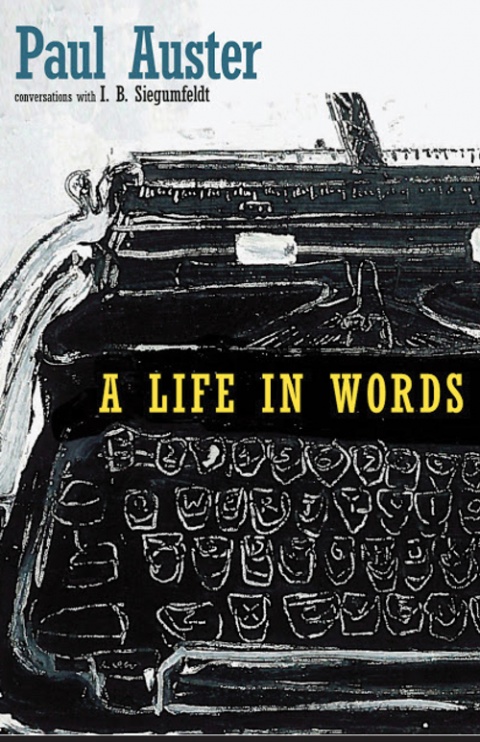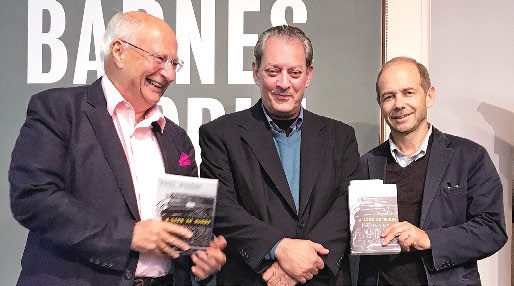Columbia College | Columbia University in the City of New York
A Life in Words: A Conversation with Paul Auster ’69 and Dan Simon ’79

In October, Columbia College Today spoke with author Paul Auster ’69, publisher Dan Simon ’79 and former College professor of English and comparative literature Michael Wood in the green room of the Union Square Barnes & Noble. The three men were connected by Auster’s newest release, A Life in Words, a written conversation about Auster’s art and craft, compiled from three years of dialogue with University of Copenhagen Professor I.B. (“Gitte”) Siegumfeldt. The book was published by Simon’s company, Seven Stories Press, and Wood was to interview Auster about the work that evening at the bookstore. At the time, Auster’s novel 4321, which follows main character Archibald Ferguson along four synchronous but different life paths, had recently been short-listed for the Man Booker Prize.
What follows is an excerpt of the conversation; the full story can be read on The Latest’s “Like Minds” at college.columbia.edu/cct/latest/minds, and the interview at Barnes & Noble can be viewed at facebook.com/sevenstories/videos.
CCT: Paul, in 2010 you told The Telegraph: “Unless it’s absolutely urgent, there’s no point in writing.”
Paul Auster ’69: That’s true! I’ve been saying that since I was 16 years old!
CCT: What felt urgent for you about your most recent books?
Auster: It’s not something you can actually articulate. It’s something that grabs hold of you — it’s as if an invisible phantom has his hands around your throat and he’s telling you you’ve got to do this or else you’re going to die [laughs].
CCT: [Laughs] So how long was the phantom of 4321 on you?
Auster: I spent only about three years on this enormous book. I was expecting six or seven when I launched into it. I was so dug in; I did the whole thing in a trance, I realize. I look back and I can barely believe I did it. It’s as if those three years are erased from my life.

Left to right: Former College professor Michael Wood, Paul Auster ’69 and
Dan Simon ’79
Jill Shomer
Michael Wood: Did you go through each “life” of your character [in the novel] sequentially?
Auster: The way you read the book is how I wrote the book. I can’t write a book out of sequence because I don’t know what I’m doing. I have to write the first sentence, then the second, then the third, all the way to the last. I can’t jump around, because everything that has led up to the sentence I’m writing at that moment is important.
CCT: Is it the same when you’re writing a memoir?
Auster: Yes, everything is the same. Find that first sentence. It’s usually the way in.
Dan Simon ’79: And many, many drafts? Or no?
Auster: No, not so many. I work paragraph by paragraph. I work in a notebook with a pen and I keep writing the paragraph over and over until I’m happy with it. Or seem to be. And then I type it up on my typewriter and I look at it clean, and I start attacking it again. Fixing, crossing out, changing. And when I can’t do any more with it, I put the typed page in the folder with the other typed pages, then I go back to the notebook and write the next paragraph.
Wood: There’s a great passage in A Life in Words about writing being a job you can’t take breaks from.
Auster: It’s the only way to justify this to myself. Why would anyone want to do this? Sit alone in a room all day every day for your whole life. I think writing literature of any kind, you have to give everything all the time. You can’t hold back. In most professions, you don’t have to give a maximum effort all the time. But as an artist, you do. There’s a moral quality to it, giving that effort, that makes it feel like you’re not wasting your time. I’m still learning and trying to figure it out.
Issue Contents
Published three times a year by Columbia College for alumni, students, faculty, parents and friends.
Columbia Alumni Center
622 W. 113th St., MC 4530, 6th Fl.
New York, NY 10025
212-851-7852
cct@columbia.edu
Columbia Alumni Center
622 W. 113th St., MC 4530, 4th Fl.
New York, NY 10025
212-851-7488
ccalumni@columbia.edu

